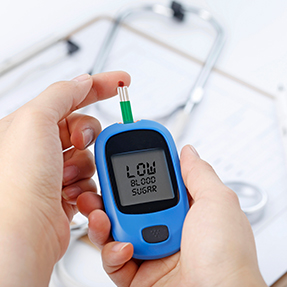
Should you monitor your blood sugar if you don’t have diabetes?
A new study suggests that men with low testosterone or “low T” have a higher incidence of severe COVID-19 than men with adequate testosterone levels. This news was found among over 700 men who tested positive for the virus and had not yet received the vaccine. Low T is well known for causing sexual dysfunction such as erectile dysfunction, low libido, depression, loss of muscle mass and strength, and reduced self-confidence in men.
“Up to one-third of men over the age of 30 have low testosterone levels,” stated Dr. Abhinav Diwan, a co-author of the study. Researchers also stated that low T in men who contracted COVID-19 had a 2.4 greater risk of needing hospitalization than men with normal testosterone levels. However, Dr. Diwan pointed out that it’s not understood if low T should be considered a risk factor for men developing severe COVID or if it results from abnormally low levels.
This is not the first time a study found that men with low T had a higher rate of hospitalization if they contracted the virus.
Specific findings from the study
Hospital systems from areas around St. Louis were studied to see if men, with low T either before they contracted COVID-19 or after recovered, had higher levels of sickness than men who did not have low T.
Specific findings from the study showed men with blood levels below 200 nanograms per deciliter of testosterone had significantly greater chances of requiring hospitalization for COVID-19. A normal testosterone level ranges between 300 to 1000 ng/dl. This finding was considered an independent risk factor from others, such as a man’s age, body weight, or any other health condition they may have had. However, an interesting finding was that men already on testosterone therapy had a lower risk for severe COVID.
Researchers with the study stated that their finding suggests but does not prove that men with low T should be considered a risk factor for developing severe COVID-19. A clinical trial would be necessary to list low T as a risk factor for severe COVID-19. Known risk factors for severe COVID are anyone with heart disease, obesity, diabetes, or chronic lung disease.
Take home message from the study
The main lesson from this study is that men’s testosterone levels, particularly as they age, should be evaluated and treated appropriately by their doctor’s recommendation. While there can be pros and cons of using testosterone replacement therapy, a potential benefit is helping men lower their risk of being hospitalized for severe COVID-19 if they contract the virus.
Dr. David Samadi is the Director of Men’s Health and Urologic Oncology at St. Francis Hospital in Long Island. He’s a renowned and highly successful board certified Urologic Oncologist Expert and Robotic Surgeon in New York City, regarded as one of the leading prostate surgeons in the U.S., with a vast expertise in prostate cancer treatment and Robotic-Assisted Laparoscopic Prostatectomy. Dr. Samadi is a medical contributor to NewsMax TV and is also the author of The Ultimate MANual, Dr. Samadi’s Guide to Men’s Health and Wellness, available online both on Amazon and Barnes & Noble. Visit Dr. Samadi’s websites at robotic oncology and prostate cancer 911.
